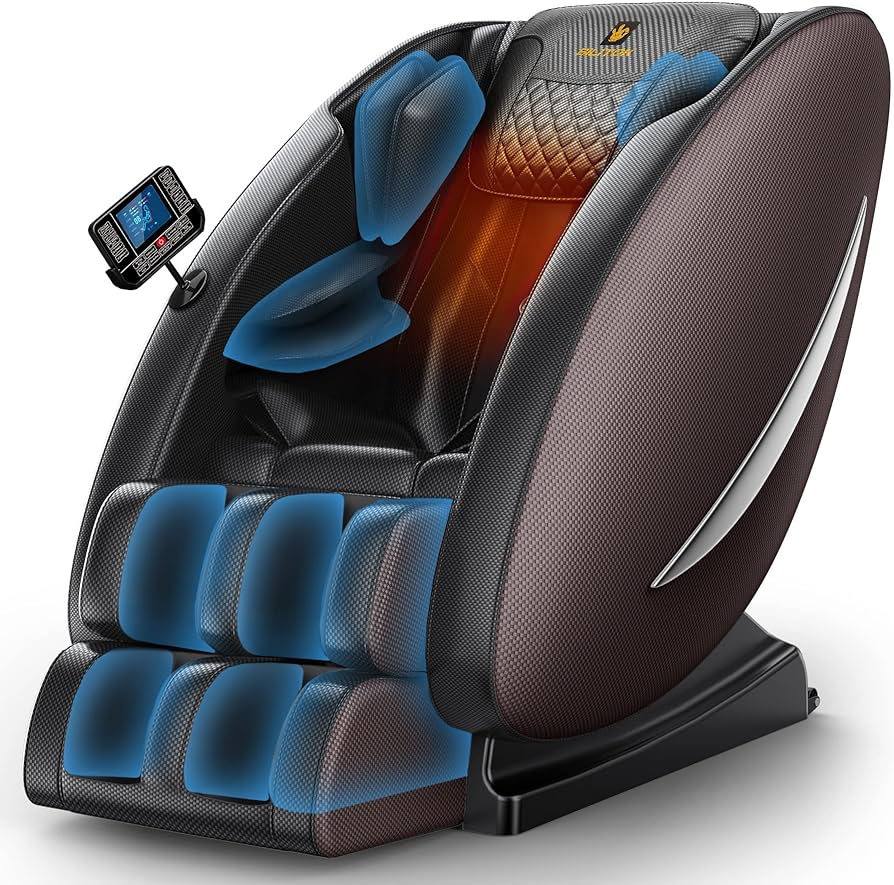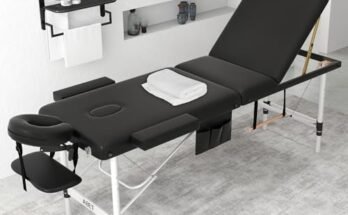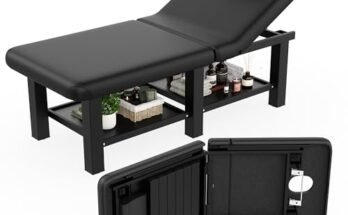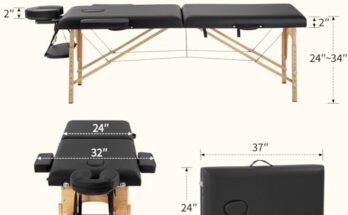Massage chairs can indeed cause bruising if used with excessive force or for extended periods. Individuals with sensitive skin or underlying health conditions are more prone to such side effects.
Massage chairs are designed to mimic the pressure and movements of a traditional massage, promoting relaxation and muscle relief. While these sophisticated chairs offer numerous benefits, including stress reduction and improved circulation, they can sometimes be too rigorous. Excessive pressure or prolonged use, particularly on high settings, can lead to bruising, especially in those with delicate skin or a predisposition to bruising easily.
It’s essential for users to find a balance and to select settings that provide therapeutic value without overstimulation. Consulting with a healthcare professional before using a massage chair can help prevent the risk of bruising and ensure that you safely reap the benefits of this technology.

Credit: www.amazon.com
The Mechanisms Of Massage Chairs
Understanding how massage chairs work is vital to unveil their magic on sore muscles. These chairs use various components to mimic the techniques of a professional masseuse.
The Role Of Pressure Points
Pressure points on the body are specific spots that, when stimulated, can release tension. Massage chairs target these areas. They are designed with sensors to locate and apply pressure.
- ReplicatedThumb-like nodes: To press on the points.
- Rhythmic compression: Aids blood flow.
- Rolled or tapped: To stimulate the body.
This technology helps reduce stress, pain, and tension. But, it can sometimes be too intense, potentially leading to bruising.
Variability In Intensity And Technique
Massage chairs offer a range of intensities and techniques. Each user can experience a different outcome.
| Intensity Level | Technique | Possible Effect |
|---|---|---|
| Low | Kneading | Gentle relax |
| Medium | Gliding | Deeper relief |
| High | Percussion | Intense work |
Choosing the right settings is key to prevent bruising. It ensures a safe and enjoyable experience.
Different bodies react differently to these techniques. It’s important to listen to your body’s signals and adjust accordingly.
Understanding Bruising
When using a massage chair, one might wonder if the powerful kneading can lead to bruising. To address these concerns, it’s key to delve into why bruises form. Knowing how bruises develop helps us comprehend how and why a massage chair might cause them. A bruise, or contusion, is a mark on your skin due to an injury.
The Anatomy Of A Bruise
Bruises form when small blood vessels, called capillaries, break under the skin. When these vessels are damaged, blood leaks into the surrounding area. This causes an initially red or dark purple mark that changes color as it heals.
The healing colors we see—a transformation from purple to green, and then yellow—are due to the body’s process of breaking down and removing the blood. The biology behind bruises is fascinating, involving clotting agents, cellular responses, and the body’s natural healing mechanisms.
Factors Contributing To Bruise Formation
Several elements can influence why a person might bruise more easily when using a massage chair. Here’s a basic list:
- Blood Thinners: Medications can increase bruising risk.
- Skin Thickness: Thinner skin bruises more easily.
- Intensity: A high force from the chair’s rollers can lead to bruising.
- Duration: Prolonged sessions might contribute to bruising.
- Pre-existing Conditions: Conditions like anemia affect bruising.
Taking these factors into account, you can adjust the use of your massage chair to prevent bruising while still enjoying its benefits.
Correlating Massage Chairs And Bruising
Massage chairs are popular for providing relaxation and comfort. Yet, a surprising concern among users is the appearance of bruises. This section dives into whether massage chairs can cause bruising and why it might happen.
Testimonies And Anecdotal Evidence
Individual experiences suggest a link between massage chairs and bruising. Users often share stories online about bruises appearing after a massage session. These personal accounts provide real-world insights into the intensity of the massage rollers and the potential for a too-robust experience.
- Intensity settings: Some users don’t adjust the settings to match their comfort level.
- Duration: Longer sessions may increase the risk of bruising.
- Sensitivity variation: Each person’s body reacts differently to pressure.
What Research Says
| Study | Findings |
|---|---|
| Pressure Levels | Appropriate adjustments are crucial to avoiding bruises. |
| Skin Conditions | Certain conditions can make skin more prone to bruising. |
| User Manual Guidelines | Following manufacturer instructions can help minimize risks. |
Scientific research provides evidence against the notion that massage chairs commonly cause bruising. Studies emphasize the importance of using the chair correctly. Experts suggest that following the right techniques and settings can help prevent unwanted bruising and ensure a safe and enjoyable experience.
Risk Factors For Bruising From Massage Chairs
Enjoying a massage chair can be a soothing experience, yet sometimes, it may result in unexpected bruising. Various factors make some individuals more prone to bruising than others. Identifying these risk factors can help minimize discomfort and ensure a safe and relaxing experience. Let’s explore what might elevate the risk of bruising when using a massage chair.
Pre-existing Health Conditions
Certain health issues can increase bruising risk. Blood-thinning medication, for instance, makes blood vessels more fragile and can cause bruising. Conditions like varicose veins or hemophilia also heighten bruising possibility. Consult your doctor before using massage chairs if you have:
- Blood disorders
- Coagulation issues
- Circulatory problems
- History of deep vein thrombosis
Personal Sensitivity And Skin Type
Skin sensitivity varies among individuals, influencing bruising likelihood. Thin or delicate skin tends to bruise easily. Identifying your skin type and sensitivity can guide the choice of a massage chair’s intensity level. Keep in mind the following:
| Skin Type | Sensitivity | Precaution |
|---|---|---|
| Fair | High | Select lower intensity |
| Thin | High | Avoid prolonged sessions |
| Elderly | High | Monitor for bruising |
Safe Use Of Massage Chairs
Many people enjoy the relaxing kneads of a massage chair after a long day. These chairs can imitate the hands of professional therapists, soothing muscles and easing tensions. Yet, without proper use, a massage chair can lead to discomfort or even bruising. It’s important to use these innovative chairs safely to enjoy their benefits without risk.
Adjusting Your Massage Chair Settings
Massage chairs offer a range of settings to suit different comfort levels and needs. To assure a safe and pleasant experience, it’s crucial to customize these settings before beginning a session.
- Intensity: Start with the lowest setting and gradually increase to find a comfortable level.
- Speed: Adjust the speed to a slow pace to avoid abrupt movements that might cause bruising.
- Position: Ensure the rollers and airbags are aligned with your body’s pressure points, not bony areas.
- Time: Limit your sessions to 15-20 minutes to prevent over-stimulation of the muscles.
Best Practices For Avoiding Injury
Following a set of best practices can further reduce the risk of injury or bruising when using a massage chair. Here are several tips:
| Practice | Reason |
|---|---|
| Wear comfortable clothing | Provides a cushion against intense pressure |
| Remove sharp objects | Prevents any punctures or pressure points |
| Stay hydrated | Helps muscles recover and reduces soreness |
| Speak up | If you feel discomfort, stop the chair immediately |
When used with care, massage chairs are a valuable tool. They can relieve stress, improve circulation, and contribute to overall wellness. Remember to always respect your body’s signals and adjust the chair accordingly.

Credit: themodernback.com
Alternatives And Precautions
An engaging massage experience can offer numerous benefits, but it’s vital to recognize that using a massage chair might lead to bruising for some individuals. This is uncommon, yet possible if one overlooks certain precautions or has specific health conditions. Let’s explore safe alternatives and key precautions to ensure a soothing and secure massage experience.
Seeking Professional Massage Therapy
Professional massage therapists tailor the pressure and technique to each person’s needs. They assess the individual’s health profile and are trained to avoid causing harm, such as bruising. Choosing a professional massage also ensures that delicate areas are treated with care. Consider the benefits:
- Adaptive techniques: Different methods for different muscle groups and problems.
- Personalized care: Attention to your specific health concerns.
- Expert guidance: Professionals give advice on maintaining muscle health.
When To Consult A Medical Professional
If you notice bruising post-massage or have medical conditions like blood disorders, consult a doctor immediately. It’s essential if you have:
| Condition | Action |
|---|---|
| Bruising with unknown cause | Seek medical advice |
| Persistent pain | Visit a healthcare provider |
| Pre-existing conditions | Discuss massage safety |
For those with health concerns or on medications that increase bruising risk, a medical professional’s insight is paramount. Ensure massage is safe for your unique situation. It may prevent unnecessary complications and bruising.
To avoid bruising from massage chairs, start with the following precautions:
- Use low-intensity settings initially.
- Gradually increase the pressure if comfortable.
- Avoid massage in areas with varicose veins or wounds.
- Shorten massage sessions to prevent prolonged pressure.
Safe massage practice can help avoid discomfort while maximizing the health benefits. Take time to explore these alternatives and precautions for a rewarding massage experience.

Credit: www.facebook.com
Frequently Asked Questions For Can Massage Chairs Cause Bruising
Can A Massage Chair Bruise You?
Yes, a massage chair can potentially cause bruising if used too aggressively or if the user has a condition that makes them prone to bruises. Adjust the settings for a gentler massage to avoid this.
Is It Normal To Get Bruises After Massage?
Yes, it’s normal to experience bruises after a massage, especially if it was deep tissue or if you’re prone to bruising.
What Happens If You Use A Massage Chair Too Much?
Overusing a massage chair can lead to muscle soreness, bruising, and inflammation. It may also exacerbate existing injuries or cause new ones. Always use massage chairs in moderation.
Are There Any Side Effects Of Massage Chair?
Massage chairs may cause discomfort, bruising, or minor injuries if overused or improperly adjusted. Users with certain health conditions should consult a doctor before use.
Conclusion
To sum up, massage chairs are generally safe, yet caution is key. Proper usage minimizes the risk of bruising. Always consider your health condition and adjust the settings accordingly. If you experience discomfort, consult a professional. Embrace the relaxation massage chairs offer with informed confidence.




